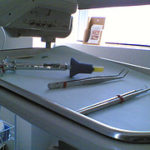 As you may or may not know I am not a huge fan of synthetic drugs. I instead encourage anxiety sufferers to find other means of managing their anxiety disorders before trying anti-anxiety medications. One of the most popular alternatives to anti-anxiety dope are dietary supplements. Today I want to explore the safety and effectiveness of five supplements commonly used to combat anxiety. Do they work and should we even bother?
As you may or may not know I am not a huge fan of synthetic drugs. I instead encourage anxiety sufferers to find other means of managing their anxiety disorders before trying anti-anxiety medications. One of the most popular alternatives to anti-anxiety dope are dietary supplements. Today I want to explore the safety and effectiveness of five supplements commonly used to combat anxiety. Do they work and should we even bother?
First I’d like to clear the air a bit and preface this article by letting you know that I am not an anti-drug zealot, far from it. In fact if you find yourself in a bind and are having a trying time with your anxiety disorder then by all means buy some drugs (after consulting with your doctor) to aide you on a temporary basis. But I am always anxious (wink) to provide you with alternatives that can help you avoid the side effects and long term addiction associated with many synthetic anti-anxiety drugs.
One of the ways people avoid the common pitfalls related to any synthetic drug is by choosing products that are deemed "natural" and "safe". Now before introducing the supplements I have in store for you let’s look at the terms natural and safe for a moment. These two terms are relative and should be taken with a grain of salt. The words natural and safe are thrown around loosely and as a result you should take care to read up on the things you plan to consume. The most important reason for this is because these so called natural and safe products are not regulated by the Food and Drug Administration and because contrary to popular belief some of these natural remedies can also have side effects.
In case you don’t know the folks at the FDA are given the task of ensuring that all the food and drugs we consume in the United States are safe. Although certain anti-anxiety drugs can leave you feeling down (literally) they have also been tested and re-tested for safety. The dosages, ingredients, etc have all been measured and scrutinized. Herbs and supplements meant for the same purpose on the other hand are not required to go through the same amount of testing or in many cases any testing at all – so buyer beware.
You need to be careful for a couple of obvious reasons. Primarily you want to make sure that you’re not ingesting any dangerous substances and that your not mixing substances in a way that can become dangerous or cause adverse effects. The most basic solution to both these problems is to talk to your doctor . If you don’t have a doctor or insurance you should cough up the fifty or so dollars you need and go talk to a doctor. Your safety is of paramount importance and you don’t want to surrender it to slick marketing, chance, or anything else that is avoidable for that matter.
Now for the supplements themselves. There are hundreds of supplements used for every ailment under the sun and they can take the form of vitamins, plant extracts, and other naturally occurring substances. Today I’ll be focusing on five non-vitamins that are commonly used as a means of reducing anxiety. The list is not exhaustive and only represents a very small percentage of what is available. Over the next several weeks I will be writing about other supplements and vitamins it’s just that there is really no need to write a 400 page dissertation about it – seriously you have better things to do.
1. Melatonin
Benefits: Melatonin is a naturally occurring hormone that helps to stimulate serotonin levels in the brain. Increasing serotonin levels is what many synthetic drugs are designed to do to help manage your anxiety. Studies have shown that it is effective for insomnia, anxiety, depression, heart disease and several other conditions.
Downside: This supplement does have some serious drawbacks however. Chief among them is the tendency to cause some people to have vivid dreams or nightmares. In addition melatonin has been known to cause stomach pain, dizziness, headache and may even worsen depression and anxiety according to some studies. There is also no known correct dosage – so start very low and work your way up if needed.
2. Sam-e
Benefits: This supplement is an amino acid that is created naturally by the body. Although the research for it’s benefits is limited there are many people (including some doctors) who believe that it can help alleviate depression, anxiety and even muscle pain and stiffness. Like Melatonin, Sam-e also seems to increase the serotonin levels in the brain which helps to stabilize mood.
Downside: Sam-e is said to be effective only in low doses since higher doses may increase anxiety, insomnia, headache and irritability. Too much of a good thing in the case of all "safe" and natural supplements can actually be bad for you.
3. 5-HTP
Benefits: This supplement is also known to increase serotonin levels (sound familiar?). This particular supplement is actually very popular since some studies have proven it to be effective in treating anxiety and depression. It is also thought that 5-HTP increases endorphins which is a naturally occurring compound that relieves pain.
Downside: This supplement is known, scientifically speaking, to reduce anxiety on a limited basis. It may cause drowsiness and should not be used if you have cardiovascular disease, are on weight loss meds, are taking tranquilizers, drink alcohol, are taking antibiotics or if you’re undergoing chemotherapy. So clearly this supplement has the potential to mix adversely with other medications so be sure to speak with your doctor.
4. Gamma Amino Butyric or GABA
Benefits: GABA is known to have "relaxing, anti-anxiety- and anti-convulsive effects". This amino acid with mild sedative effects is also thought to promote sleep. To read more about GABA click here .
Downside: May cause stomach pain, nausea, change heart and breathing rates, numbness in the arms/legs and if taken in high doses can make your anxiety worse.
Benefits: St. John’s wort is an herb extracted from the plant, you guessed it, called St. John’s wort. It is a yellow flower that has been used for medicinal purposes for thousands of years. It is used to treat the three things that are most common in anxiety disorders, namely anxiety, insomnia and depression. It is taken in tea or pill form and is thought to be effective on mild cases of anxiety and depression.
Downside: Some studies indicate that it is no more effective than a placebo and may even increase anxiety in some people. It can also cause dry mouth, dizziness, stomach ailments, fatigue, headache and cause sensitivity to sunlight. You should not take St. John’s wort if you are on antidepressants.
Many of these supplements have similar benefits and side effects as can be seen in the examples I selected. They are primarily used to increase serotonin, adjust your mood, and calm you. They can however also cause stomach problems, headaches, and in the worse case scenario worsen your anxiety symptoms.
I strongly encourage you to use caution with any herb or other natural supplement. You should always talk to your doctor about any supplements, medications or even vitamins your taking because these can all mix in a way that can cause you problems. A lot of the side effects are mild, but nonetheless take care of yourself by doing the research.
If you find a supplement you’d like to try and have cleared it with a health care professional then take low doses and head out from there. Try not to be cute and win yourself a trip to the ER because you failed to use good judgment. It is too easy to get caught up in eye catching slogans and product eye candy. Look past all the marketing psychobabble and make sure you make decisions based on sound information and not a desperate attempt to eradicate your anxiety. So to answer the questions I set out to answer – do they work? Sometimes for some people. Should we bother? Yes, I think so.





Healthy diet plan…
Thank you very much. Sunny article…